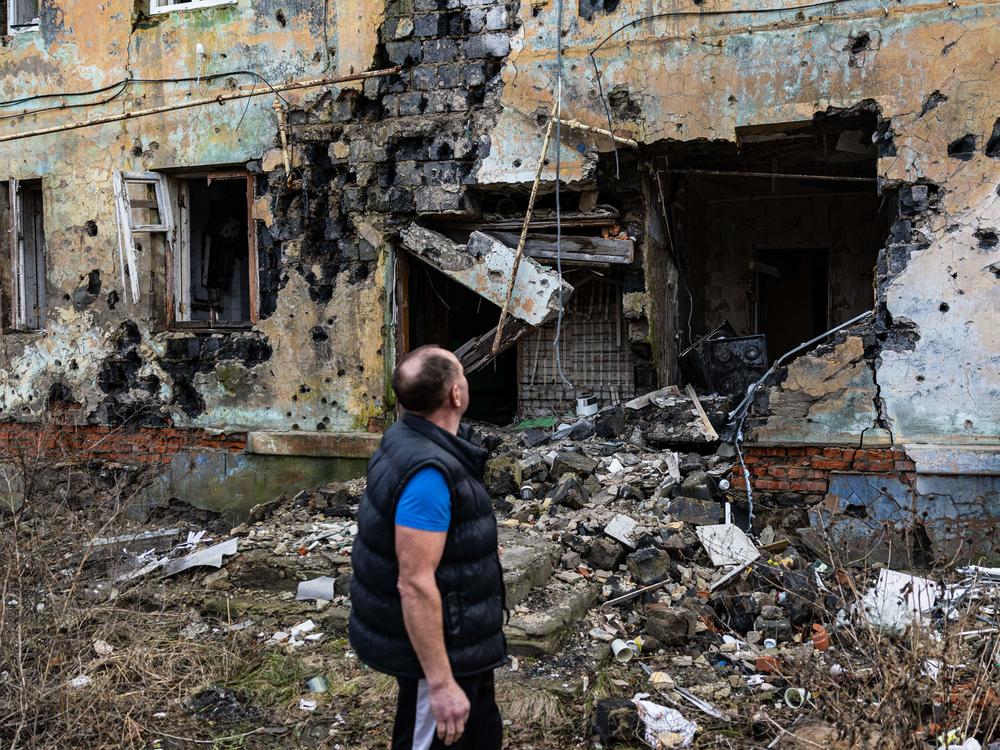Section Branding
Header Content
Putin orders a temporary cease-fire in Ukraine
Primary Content
Updated January 5, 2023 at 12:42 PM ET
MOSCOW — Russian President Vladimir Putin has instructed his country's defense minister to order a temporary cease-fire in Ukraine over Orthodox Christmas.
The ceasefire will begin for 36 hours at noon on Jan. 6. Orthodox Christmas is traditionally celebrated by many on Jan. 6 and 7.
According to the Kremlin's press service, Putin made the announcement in response to an earlier call by the leader of the Moscow Patriarchate of the Russian Orthodox Church, Patriarch Kirill, for guns to go silent over the Orthodox holiday.
"Due to the fact that a large number of citizens of the Orthodox faith live in several areas of the conflict zone, we call on the Ukrainian side to observe a ceasefire and allow them to visit Christmas Eve services, as well as those on the day of the birth of Christ," said a statement posted to the Kremlin website.
Patriarch Kirill has been an avid supporter of the Kremlin's actions in Ukraine — including telling Russian soldiers that dying for the cause would "wash away all sins." His support of the Russian military has divided the world Orthodox faithful.
In May, the Council of the Ukrainian Orthodox Church formally broke with the Moscow Patriarch over his open support of the war — a move that Ukrainian officials noted in condemning the cease-fire offer.
The Russian Orthodox Church "is not an authority for global Orthodoxy & acts as a 'war propagandist,'" Ukrainian presidential adviser Mikhailo Podolyak tweeted. "Thus, ROC's statement about 'Christmas truce' is a cynical trap & an element of propaganda," he concluded, using an abbreviation for the Russian Orthodox Church.
Others accused Russia of planning to use any break in fighting to rearm in preparation for future assaults.
"Let's let the Orthodox believers go to church on Christmas. They declare a truce and, at the same time, sit and reload their rockets. Bastards," wrote Boris Filatov, the mayor of the Ukrainian city of Dnipro, in a Telegram post.
In Washington, President Biden told reporters, "I'm reluctant to respond to anything Putin says. And I found it interesting. He was ready to bomb hospitals and nurseries and churches on the 25th and New Year's. And, I mean, I think he's trying to find some oxygen."
State Department spokesperson Ned Price told reporters, "Our concern ... is that the Russians would seek to use any temporary pause in fighting to rest, to refit, to regroup and ultimately to to re-attack. And so in that sense, it can't be considered a cease-fire if the intent is to train their fire with even more vengeance, with even more ferocity, with even more lethality against the people of Ukraine. If Russia were truly serious about peace, about ending this war, it would withdraw its forces from the sovereign territory of Ukraine. That is what constitutes an end to this war."
The White House announced Thursday that the U.S. will send Bradley infantry fighting vehicles to Ukraine, and Germany will send Marder infantry fighting vehicles plus an additional Patriot air defense battery.
Even in Russia, there were few signs the cease-fire could be anything more than a temporary halt in the fighting.
In a call with Putin earlier in the day, Turkey's President Recep Tayyip Erdogan asked the Russian leader to implement a unilateral cease-fire to support efforts to end the war.
In response, Putin repeated Russian demands that Ukraine accept Moscow's recent annexation of four regions of Ukraine before "serious dialogue" could begin, according to a Kremlin readout of the exchange.
Russia's annexation moves have been widely condemned as illegal, and Russian forces have failed to maintain control over the territories.
Ukraine maintains that peace can be only achieved when Russian forces leave the occupied territories — including Ukraine's Crimean peninsula, which Russia seized in 2014.
This is a breaking news story and will be updated.
Copyright 2023 NPR. To see more, visit https://www.npr.org.

